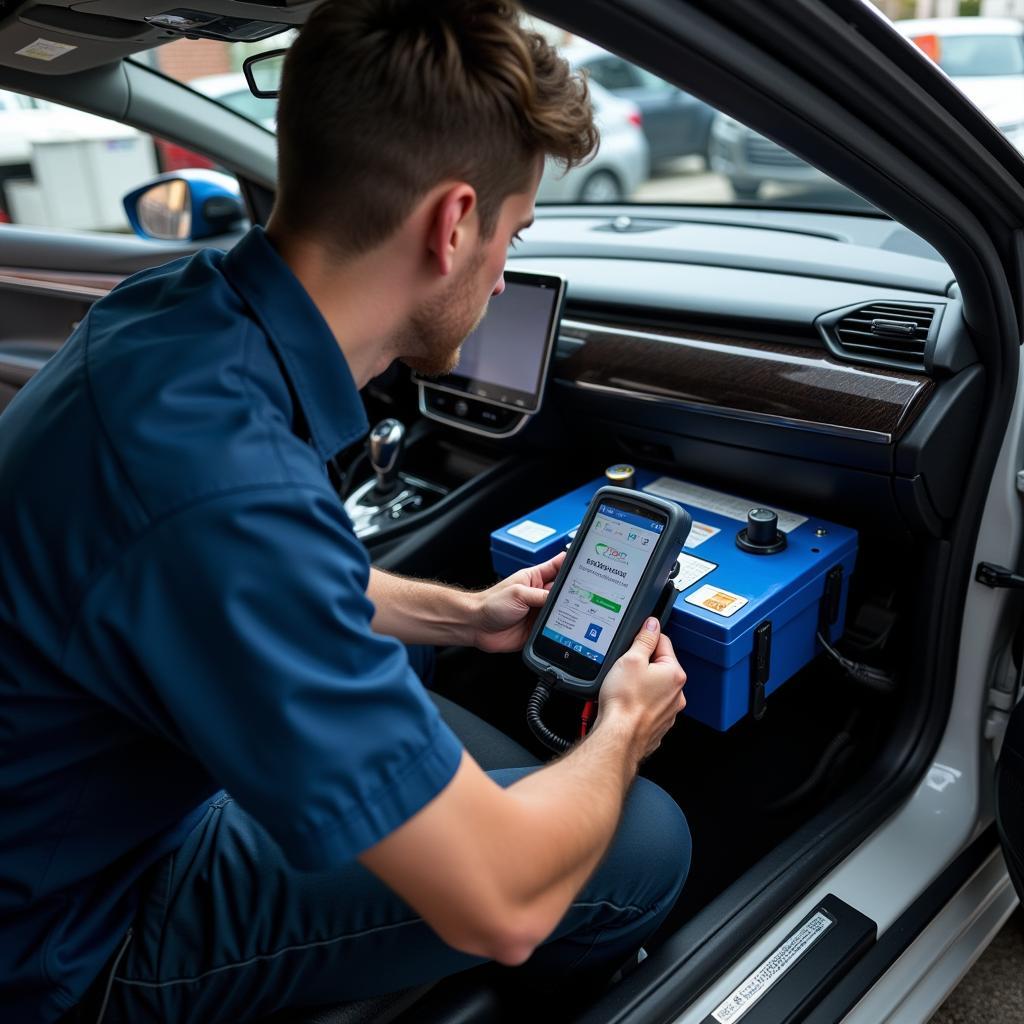Does Electric Car Need Servicing?
Electric cars are revolutionizing the automotive world, and one of the most frequent questions potential buyers have is: Does Electric Car Need Servicing? The simple answer is yes, but it’s significantly different from the maintenance required for gasoline-powered vehicles. While EVs don’t have engines requiring oil changes, spark plugs, or fuel filters, they still have components that need regular checks and occasional replacements.
Understanding Electric Car Servicing
Electric car servicing focuses on different areas compared to traditional cars. Instead of oil changes and transmission flushes, EV servicing revolves around the battery pack, electric motor, brakes, tires, and other essential components. Regular maintenance is crucial for ensuring optimal performance, extending the lifespan of the vehicle, and addressing potential issues before they escalate. It also helps maintain the vehicle’s resale value. Thinking about how often does an electric car need servicing? Check out our detailed guide.
One crucial aspect of EV servicing is the battery health check. Battery packs degrade over time, and regular inspections can identify potential issues early on. This includes checking the battery’s state of charge, voltage, and overall health.
Another important area is the electric motor. While generally robust, the motor requires periodic inspections to ensure proper lubrication and cooling system functionality. This prevents overheating and potential damage.
 Electric Car Battery Check
Electric Car Battery Check
Key Differences Between Electric and Gasoline Car Servicing
The most significant difference between servicing an electric car and a gasoline car lies in the complexity of the engine. Internal combustion engines (ICEs) have numerous moving parts requiring frequent lubrication and replacement. Electric motors, on the other hand, are considerably simpler, leading to less frequent and less intensive servicing. Learn more about traditional car maintenance in our guide on what is involved in a major car service.
Brake maintenance is also different. Electric vehicles utilize regenerative braking, which helps recapture energy during deceleration. This reduces wear and tear on the traditional braking system, meaning brake pads and rotors last considerably longer than in gasoline cars.
Furthermore, EVs don’t require the regular fluid changes associated with ICE vehicles. No oil changes, transmission fluid flushes, or coolant replacements are necessary, further reducing the overall maintenance costs. Curious about charging costs during servicing? Explore our article on how much to charge electric car at services.
How Often Does an Electric Car Need a Service?
The frequency of servicing for electric cars varies depending on the manufacturer’s recommendations and individual driving habits. However, a general guideline is to have your EV serviced at least once a year or every 10,000-12,000 miles. Want to know what’s done during a second car service? Find out in our article: what is done in second service of car.
This annual service typically includes a comprehensive inspection of the battery, motor, brakes, tires, suspension, and other vital components. Technicians will also check the software and update it if necessary.
Beyond the annual service, it’s crucial to pay attention to any unusual noises, vibrations, or performance issues. If you notice anything out of the ordinary, it’s best to consult a qualified EV technician as soon as possible. Not sure if your car needs a service? We have a guide on how to tell when your car needs a service.
What to Expect During an Electric Car Service
During a typical EV service, technicians will perform a multi-point inspection covering various aspects of the vehicle. This includes:
- Battery health check: Assessing the battery’s capacity, voltage, and overall condition.
- Electric motor inspection: Checking for proper lubrication and cooling system functionality.
- Brake inspection: Evaluating brake pad thickness, rotor condition, and brake fluid levels.
- Tire rotation and pressure check: Ensuring even tire wear and optimal tire pressure.
- Suspension and steering inspection: Checking for any signs of wear or damage.
- Software updates: Installing the latest software updates for optimal performance and functionality.
“Regular servicing is crucial for maintaining the longevity and performance of an electric vehicle,” says John Smith, Senior EV Technician at CarServiceOnline. “It’s not just about fixing problems, but also about preventing them.”
Conclusion
So, does electric car need servicing? Absolutely. While different from traditional gasoline cars, regular maintenance is essential for ensuring the optimal performance, safety, and longevity of your electric vehicle. By adhering to the manufacturer’s recommended service intervals and addressing any potential issues promptly, you can enjoy the many benefits of electric driving for years to come.
FAQ
- Are electric car services cheaper than gasoline car services? Generally, yes.
- Do I need a specialist to service my electric car? Yes, it’s recommended.
- How long does an electric car service take? It depends on the service, but typically a few hours.
- What is regenerative braking? A system that recharges the battery during braking.
- How can I extend the life of my EV battery? Avoid extreme temperatures and maintain a consistent charging routine.
- What are some signs my EV needs servicing? Unusual noises, reduced range, or warning lights.
- Can I service my electric car at home? Some basic maintenance can be done at home, but professional servicing is recommended.
Need assistance with your electric vehicle? Contact us via WhatsApp: +1(641)206-8880, Email: [email protected], or visit us at 456 Oak Avenue, Miami, FL 33101, USA. Our dedicated customer support team is available 24/7.

